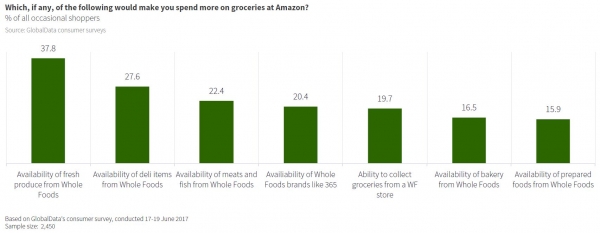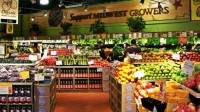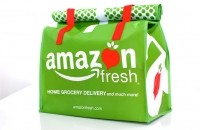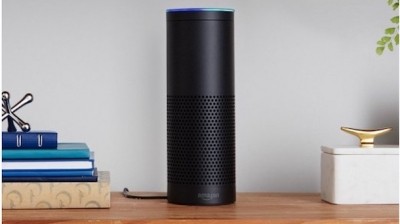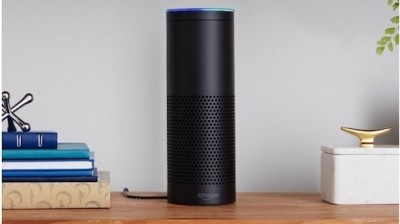Whole Pay Check? Not any more, says Amazon
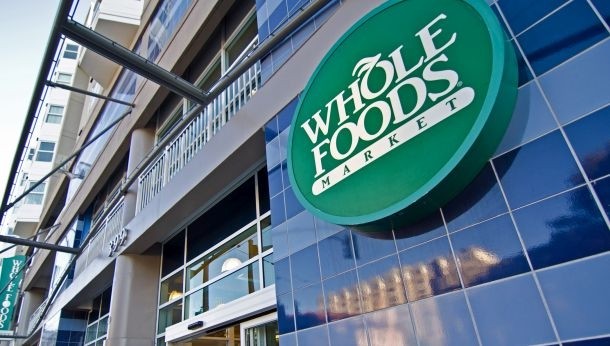
In a note issued after Amazon and Whole Foods sent out a press release announcing a wave of price cuts on staples starting Monday, Saunders said: “Today's announcement… signals a clear intention to remedy what has been one of the grocery chain's biggest weaknesses. It will, at a stroke, help improve basket sizes, transaction values, and customer loyalty.”
Longer term, however, Amazon’s plan to integrate its Prime loyalty scheme with Whole Foods’ customer rewards program, providing Prime members with special benefits; sell Whole Foods’ 365 private label products via Amazon.com, AmazonFresh, Prime Pantry and Prime Now; and turn selected Whole Foods stores into collection points for Amazon.com orders; will be of even greater strategic significance, he predicted.
“Not only will this allow Amazon to target discounts and offers effectively, it will also give it significant intelligence on the preferences and habits of Whole Foods shoppers. Given that 70.3% of Whole Foods core customers are already members of Amazon Prime, the linkage covers a significant part of the existing shopper base."
This will provide a measurable improvement to Amazon's own food proposition
The plan to sell Whole Foods' private label products through Amazon's other channels is "no surprise," he added.
"Given the high regard in which the brands are held, this will provide a measurable improvement to Amazon's own food proposition. Moreover, it will facilitate greater volumes which will generate economies of scale and cost savings down the line.
“Amazon is wasting no time in making the most of its newest division. Worryingly for others in the market, these things are only the opening salvo in what will be a time of rapid change.”
Kantar Retail: Deal could prompt wave of e-commerce M&A activity
And it's the speed with which Amazon seems to want to move that is generating such anxiety in the market, Kantar Retail analyst Elley Symmes told FoodNavigator-USA, with some commentators predicting it might prompt a flurry of M&A activity as traditional bricks & mortar players buy in expertise via acquisitions or partnerships.
"The competition just doesn't have the skillset inhouse to respond quickly in a meaningful way. So I think we'll see more M&A. You could see someone like Kroger coming in and buying Instacart, for example."
As for the price cuts, they underline the fact that Amazon is "not worried about margins" and is prepared to play the long game with this deal, she said, which will put further pressure on a sector already dealing with the rise of Lidl and Aldi.
While Whole Foods' stores were not designed to operate as fulfilment centers for online orders, she acknowledged, "You could see Amazon taking the 10 or 20 most unproductive stores, plus stores that haven't been remodeled in a while and re-organize the space or turn them into dark stores/fulfilment centers. However, they are not going to turn all the stores into Amazon fulfilment centers for food - they bought Whole Foods because of its brand equity so they aren't going to change that.
"I think when they open new stores, though, you'll see more of a hybrid model."
According to Kantar data, around 30% of US primary households have an Amazon Prime membership, while 64% of shoppers overall shop on Amazon.com, she said. "But only 12% of Amazon shoppers currently shop at Whole Foods, so this is an opportunity to bring the Whole Foods brand to the masses."
WHAT HAPPENS NEXT?
- Prices will be cut on staple items from Monday August 28
- Amazon Prime to become Whole Foods’ customer rewards program, “providing Prime members with special savings and other in-store benefits.”
- Whole Foods’ private label products—including 365 Everyday Value, Whole Foods Market, Whole Paws and Whole Catch—will be available via Amazon.com, AmazonFresh, Prime Pantry and Prime Now.
- Amazon Lockers will be available in select Whole Foods stores allowing customers to pick up products ordered via Amazon.com at their local Whole Foods store.
- Longer term, Amazon and Whole Foods also “plan to offer more in-store benefits and lower prices for customers over time as the two companies integrate logistics and point-of-sale and merchandising systems.”
Source: Amazon/Whole Foods press release, August 28
We’ll lower prices, but not standards…
In a press release issued Thursday, Jeff Wilke, CEO of AmazonWorldwide Consumer, said: “We’re determined to make healthy and organic food affordable for everyone. Everybody should be able to eat Whole Foods Market quality – we will lower prices without compromising Whole Foods Market’s long-held commitment to the highest standards.”
He added: “We will… continuously lower prices as we invent together. There is significant work and opportunity ahead, and we’re thrilled to get started.”
“Customers will enjoy lower prices on products like Whole Trade bananas, organic avocados, organic large brown eggs, organic responsibly-farmed salmon and tilapia, organic baby kale and baby lettuce, animal-welfare-rated 85% lean ground beef, creamy and crunchy almond butter, organic Gala and Fuji apples, organic rotisserie chicken, 365 Everyday Value organic butter, and much more.”
Amazon/Whole Foods press release, August 28
A spokesman would not say if the initial round of price cuts – news of which immediately dented the share price of Kroger, Wal-Mart, Target, Costco, Supervalu and Sprouts Farmers Markets - had been funded by suppliers, by Amazon/Whole Foods, or by a combination of both.
He also declined to comment on how deep the discounts would be, but stressed that this wasn’t a short term promotion: “We’re not commenting beyond what’s in the press release, but hopefully the release makes it clear that this is a long-term investment – it is, and as the release says, there will be more to come.”
Whole Foods co-founder John Mackey – who will stay on as CEO when the deal closes on Monday - added that the firm would “continue to expand our efforts to support and promote local products and suppliers.”
According to retail research firm and consultancy GlobalDataRetail: “Amazon has more grocery shoppers than Whole Foods, but the vast majority only buy only a handful of non-perishable items a year. To date, Amazon’s Fresh service is confined to a handful of urban and suburban areas with high population densities (eg. New York, L.A, San Francisco). This focus is necessary in order to support the volume required to be operationally effective. Even so, we do not believe the service is profitable – something that restricts the pace and scope of future expansion.
"The catchments of many Whole Foods stores overlap with Amazon Fresh’s existing service areas – this will allow Amazon to test a number of different delivery and logistics solutions, with the aim of streamlining the operations of both businesses. However, in addition to this, Whole Foods gives Amazon access to a number of lucrative markets in places like Phoenix, Minneapolis, Houston and Portland. It also allows Amazon to play in lower density locations."
“Amazon has a huge customer database and owns the lion share of e-commerce purchasing, nearly $100bn in sales, and understands direct to consumer marketing and fulfillment better than any other grocery retail chain.
“The deal allows Whole Foods to be a key component in creating the new definition for grocery retail and a key part of designing the interface between online ordering, home delivery and in store shopping.
“We think that Amazon will use this brick and mortar foothold to create a truly interactive shopping experience...a cross over between online service level interaction and face to face connections with customers.”
Jim Fosina, CEO, Fosina Marketing Group
